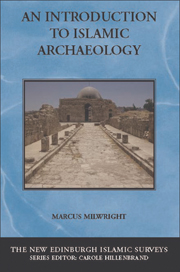Book contents
- Frontmatter
- Contents
- List of figures
- Acknowledgements
- Notes on transliteration and dating
- List of abbreviations
- 1 Introduction
- 2 Early Islam and late antiquity
- 3 New directions in the early Islamic period
- 4 The countryside
- 5 Towns, cities and palaces
- 6 Religious practice in the Islamic world
- 7 Crafts and industry
- 8 Travel and trade
- 9 The ‘post-medieval’ Islamic world
- 10 Conclusion
- Glossary
- Dynasties and periods
- Bibliography
- Index
9 - The ‘post-medieval’ Islamic world
Published online by Cambridge University Press: 05 August 2013
- Frontmatter
- Contents
- List of figures
- Acknowledgements
- Notes on transliteration and dating
- List of abbreviations
- 1 Introduction
- 2 Early Islam and late antiquity
- 3 New directions in the early Islamic period
- 4 The countryside
- 5 Towns, cities and palaces
- 6 Religious practice in the Islamic world
- 7 Crafts and industry
- 8 Travel and trade
- 9 The ‘post-medieval’ Islamic world
- 10 Conclusion
- Glossary
- Dynasties and periods
- Bibliography
- Index
Summary
The archaeological studies discussed in the previous chapters have dealt in the main with material dating before the fifteenth century. Indeed, it is only relatively recently that the material culture of the later centuries has become a focus of interest in the sub-discipline of Islamic archaeology, and in archaeology in general. The relatively small number of published reports dealing with the period from the fifteenth to the early twentieth century limit the scope of synthetic analysis, though the fast pace of developments in this area gives reason for the optimistic view that archaeology will make a genuine contribution to the study of this period. The abundance of archival data and other written sources from these centuries offers rich resources for historians, and their reconstructions of social and political life and of the shifting dynamics of inter-regional and international trade provide a vital framework for the interpretation of archaeological data from excavations and surveys.
While there can be little doubt that the economies and political structures of the Islamic world experienced major transformations between the end of the fifteenth century and the beginning of the twentieth, it would be futile to point to one historical event or socio-economic phenomenon that marked the end of the ‘medieval’ Islamic world. This was rather the action of many factors occurring at different rates in the Islamic world, and often affecting urban and rural populations in different and sometimes unpredictable ways.
- Type
- Chapter
- Information
- An Introduction to Islamic Archaeology , pp. 174 - 191Publisher: Edinburgh University PressPrint publication year: 2010



